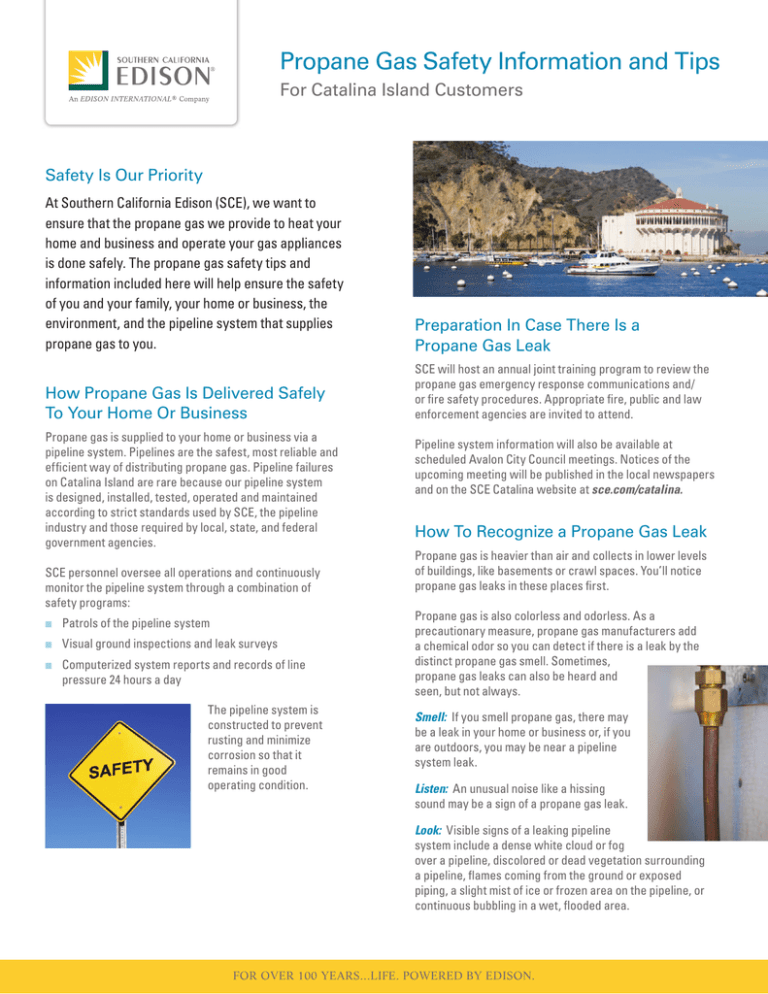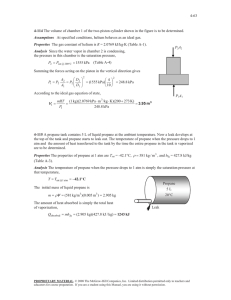
Propane Gas Safety Information and Tips
For Catalina Island Customers
Safety Is Our Priority
At Southern California Edison (SCE), we want to
ensure that the propane gas we provide to heat your
home and business and operate your gas appliances
is done safely. The propane gas safety tips and
information included here will help ensure the safety
of you and your family, your home or business, the
environment, and the pipeline system that supplies
propane gas to you.
Preparation In Case There Is a
Propane Gas Leak
How Propane Gas Is Delivered Safely
To Your Home Or Business
SCE will host an annual joint training program to review the
propane gas emergency response communications and/
or fire safety procedures. Appropriate fire, public and law
enforcement agencies are invited to attend.
Propane gas is supplied to your home or business via a
pipeline system. Pipelines are the safest, most reliable and
efficient way of distributing propane gas. Pipeline failures
on Catalina Island are rare because our pipeline system
is designed, installed, tested, operated and maintained
according to strict standards used by SCE, the pipeline
industry and those required by local, state, and federal
government agencies.
SCE personnel oversee all operations and continuously
monitor the pipeline system through a combination of
safety programs:
n
Patrols of the pipeline system
n
Visual ground inspections and leak surveys
n
Computerized system reports and records of line
pressure 24 hours a day
The pipeline system is
constructed to prevent
rusting and minimize
corrosion so that it
remains in good
operating condition.
Pipeline system information will also be available at
scheduled Avalon City Council meetings. Notices of the
upcoming meeting will be published in the local newspapers
and on the SCE Catalina website at sce.com/catalina.
How To Recognize a Propane Gas Leak
Propane gas is heavier than air and collects in lower levels
of buildings, like basements or crawl spaces. You’ll notice
propane gas leaks in these places first.
Propane gas is also colorless and odorless. As a
precautionary measure, propane gas manufacturers add
a chemical odor so you can detect if there is a leak by the
distinct propane gas smell. Sometimes,
propane gas leaks can also be heard and
seen, but not always.
Smell: If you smell propane gas, there may
be a leak in your home or business or, if you
are outdoors, you may be near a pipeline
system leak.
Listen: An unusual noise like a hissing
sound may be a sign of a propane gas leak.
Look: Visible signs of a leaking pipeline
system include a dense white cloud or fog
over a pipeline, discolored or dead vegetation surrounding
a pipeline, flames coming from the ground or exposed
piping, a slight mist of ice or frozen area on the pipeline, or
continuous bubbling in a wet, flooded area.
FOR OVER 100 YEARS...LIFE. POWERED BY EDISON.
Propane Gas Safety Information and Tips
For Catalina Island Customers
What To Do If You Suspect a
Propane Gas Leak
If you smell propane gas or suspect a leak has occurred:
1. Do not touch, breathe or make contact with leaking
propane gas.
2. Get all occupants out of your home or building,
opening doors and windows to ventilate area.
3. If you are outside, leave the area immediately. Walk
into the wind, away from the propane gas.
4. Propane gas can ignite if it is released or leaked. Do
not light a match, start an engine, use a cell phone,
or do anything that may create a spark.
5. Turn off any machinery and equipment; however,
if a propane gas cloud has surrounded a piece of
equipment, do not go into the cloud to turn it off.
6. FROM A SAFE LOCATION, CALL LOCAL EMERGENCY
RESPONDERS AT 911 AND SCE AT (800) 367-8851
AS SOON AS POSSIBLE.
7. Provide a description of the propane leak and
its location.
8. Warn others to keep away.
Where Are the Underground
Propane Gas Pipelines?
Generally, propane gas is supplied by an underground
“main” pipeline located in the middle of the street in front
of your home or business. Additional underground piping
runs from the main pipeline to the propane gas meter that
supplies propane gas to your home or business. In open
areas, main pipelines are marked with aboveground signs
to indicate the general location, SCE contact information,
and that the pipeline contains propane gas. Markers
do not provide information on the depth or number of
pipelines in the vicinity and the markers do not indicate
the exact position of the pipeline.
Pipelines Need To Be
Protected From Damage —
Call Before You Dig
Everyone can contribute to the
safety and security of the pipeline
system on Catalina Island. Any
activity near or on a pipeline route,
even something as simple as
planting a tree or building a fence,
can potentially damage a pipeline.
A gouge, scrape, dent or crease to
a pipeline or its coating may cause
a break or leak in the future. If you
plan to dig, drill, or engage in any
other activity that could damage
a pipeline, call Dig Alert at 811
at least 48 hours before you dig
or excavate.
When you call Dig Alert, SCE personnel will come out
and mark the pipeline route for you. When excavating
near propane gas piping, the excavation must be done
with hand tools until the propane gas line is found.
If you know of what could be considered even
minor damage to a pipeline, please contact SCE
immediately at (800) 367-8851 so we can investigate
any possible damage.
Aboveground Care of
Pipeline Routes
Pipeline routes must be kept free from structures and
other obstructions. If a pipeline crosses your property,
please do not plant trees or high shrubs along the route.
Also, do not store or place anything on or near the
pipeline route without first contacting SCE so we can
explain the company’s construction guidelines to
you. Contact SCE during normal business hours at
(310) 510-4312 if you have any questions.
FOR OVER 100 YEARS...LIFE. POWERED BY EDISON.
Propane Gas Safety Information and Tips
For Catalina Island Customers
Customer Responsibilities
Proposition 65 Public Warning
SCE’s responsibilities for operating and maintaining the
propane gas pipeline system on Catalina Island ends at
and includes the propane gas meters located at your
home or business. All piping and other components from
the propane gas meter to residences or businesses is
the responsibility of the customer. Customer piping may
be buried or it may be above ground or both. Your piping
may corrode or leak and should be inspected periodically
and repaired if unsafe conditions are discovered. Most
plumbing and heating contractors can assist you in
locating, inspecting, and repairing piping.
The Safe Drinking Water and Toxic Enforcement Act of
1986, commonly referred to as Proposition 65, requires the
Governor to publish a list of chemicals “known to the State
to cause cancer, birth defects, or reproductive harm.” It also
requires California businesses to warn the public quarterly
of potential exposure to these chemicals which result from
the products they use, make, or distribute.
Additional Safety Tips
n
n
n
Never use a propane gas oven or stove burners to
provide heating, and do not use any portable heaters
that aren’t designed for indoor use.
Don’t use an outdoor barbeque grill indoors for
cooking or heating.
You should also have your propane gas appliances
tested regularly by qualified technicians, and make
sure your propane gas appliances are well-ventilated.
Southern California Edison facilities store propane and
distribute propane to wholesale and retail customers in
California for various uses. Propane itself is not a listed
Proposition 65 chemical. The combustion of propane in
appliances, such as stoves or heating systems and vehicles
using propane creates harmful chemicals. These chemicals
include carbon monoxide, benzene, formaldehyde, and
acetaldehyde — all chemicals known to the State to cause
cancer and/or birth defects.
Southern California Edison encourages all of its customers
to use propane safely. You should read and follow all use,
care, and manufacturer instructions for propane appliances
and equipment. Proper ventilation and frequent inspection of
propane appliances and equipment are highly recommended.
A warning odorant is added to propane so that leaks of
unburned gas can be quickly detected. If a gas odor is
detected, contact a qualified service technician immediately.
sce.com/catalina
If you are not a resident of this address, please display
this brochure prominently at the residence or place of
business or ensure that tenants receive a copy.
©2014 Southern California Edison. All rights reserved.
FOR OVER 100 YEARS...LIFE. POWERED BY EDISON.



